Back to the Real Side of the Economy: Recession Watch (9/15/2008)
Only on a day like today does an over 1 percent decrease in industrial output move to third page. But this item (and this hilarious article h/t Economists View) reminded me to update the indicators used by the NBER BCDC are headed. Their trajectories are, in general, not too comforting.
Consider first the series that prompted the investigation. In Figure 1, I show (in logs) industrial production and manufacturing production; the former is the one considered by the NBER BCDC.
Figure 1: Log industrial production (blue), and log manufacturing production (NAICS definition), 2002=100. Line at industrial production peak; NBER recession dates shaded gray. Source: Federal Reserve Board via St. Louis Fed FRED II, accessed 15 September 2008.The peak was in January 2008 for industrial production. Interestingly, the peak for manufacturing was earlier, in September 2007. I found this remarkable given the stress that has been made about strong export growth supporting US aggregate demand. I would have thought there would be a much less marked decline in manufacturing output. But apparently this is not the case.
Next consider nonfarm payroll employment. I’ve discussed the various aspects of the August employment situation release already [1], but it’s useful to recap what the peak in this series was: December 2007.
Figure 2: Log nonfarm payroll employment (blue). Dashed line indicates peak; NBER recession dates shaded gray. Source: Federal Reserve Board via St. Louis Fed FRED II, accessed 7 September 2008.Now consider real personal income less transfers and real manufacturing and trade sales, the last two key series focused on by the NBER BCDC.
Figure 3: Log personal income less transfers in Ch.2000$ (blue). Real personal income calculated by subtracting off transfers from personal income, and deflating by the personal consumption expenditure deflator. Dashed line at peak; NBER recession dates shaded gray. Source: BEA GDP release of 29 August 2008, and Supplemental Table 2BU, and St. Louis Fed FRED II, accessed 7 September 2008, and author’s calculations.
Figure 4: Log manufacturing and trade sales in Ch.2000$ (blue). Dashed line at peak; NBER recession dates shaded gray. Source: BEA GDP release of 29 May, and Supplemental Table 2BU.Both of the series peaked in October 2007, although it is conceivalble that manufacturing and trade sales have reversed course (the last observation is for June).
Now, not all the news is bad for the times-are-fine thesis. The month-old GDP index compiled by Macroeconomic Advisers indicates that June 2008 GDP was substantially up.
Figure 5: Monthly log GDP (Ch.2000$). NBER defined recession dates shaded gray. Source: Macroeconomic Advisers [xls], August 15, 2008 release.Of course, June is in 2008Q2, and we’re now puzzling over 2008Q3. We’ll just have to wait for Macroeconomic Advisers’ newest estimate (which should come out any day now). e-forecasting‘s estimate for July and August month-on-month annualized growth averages out to 1.65%. The one point that I would observe is that just as official GDP is revised as the source data is revised, so too is the Macroeconomic Advisers series (and presumably the e-forecasting one as well). From the February Macroeconomic Advisers’ report on the monthly GDP series:
…As currently estimated, Monthly GDP in December 2007 was at an all-time high, suggesting that it’s unlikely that the economy slipped into recession at the end of last year. However, revisions to the underlying source data could overturn this observation.
That’s a cautionary note, given what previous revisions have done to the official GDP series: [2], [3].
I’ll let the reader decide what to make of these trends. For me, they merely confirm what Jim wrote a week and a half ago.
And if you remain skeptical that we are in, or about to enter, a recession, then three things to consider:
- The current financial crisis is in some sense the reflection of the failure of certain institutions to deleverage, or recapitalize, fast enough. This process is going to further reduce the availability of credit, thereby slowing down the economic activity further — a process laid out in this post.
- The decrease in the equity markets today, if persistent, will further constrain consumption, to the extent that wealth is a argument in the aggregate consumption function (4 cents on the dollar is the conventional wisdom regarding the MPC out of financial wealth).
- The losses to equity markets — and jamming up of credit markets — appears to be a trans-Atlantic phenomenon. Hence, the likelihood that rest-of-world economic activity can continue to sustain US aggregate demand seems ever smaller.
See also Brad Delong.
[Update, 9/16 9:12am Pacific]: Macroeconomic Advisers has released its GDP series, up to July. H/t Peter Summers.
Figure 6: Monthly log GDP (Ch.2000$), release of 16 Sep (blue) and of 15 Aug (red); MA forecast (teal +). NBER defined recession dates shaded gray. Source: Macroeconomic Advisers [xls].[Update, 9/16 12:55pm Pacific]: e-forecasting’s Maria Simos has kindly provided me the data for e-forecasting’s monthly GDP series, extending up to August. It is plotted with the Macroeconomic Advisers’ series in Figure 7 below. The August figure was revised downward to -0.3%. This means the average growth rate over July and August has been revised down from 1.65% at annual rates to 0.05%.
Figure 7: Monthly log GDP (Ch.2000$), Macroeconomic Advisers release of 16 Sep (blue), MA forecast (teal +), and e-forecasting release of 16 Sep (maroon). Source: Macroeconomic Advisers [xls], and e-forecasting release of 16 Sep.
See the rousing defense of Don Luskin’s (in)famous article in the comments section from Rich Berger, DickF, and Buzzcut.
Interestingly, on 9/12, I noted the CBO estimated a -3% output gap as of 2009Q2, and my own quadratic trend estimate of potential, combined with WSJ forecast, implied a -4% output gap. Latest estimate (2018Q1 3rd release, CBO August 2018 estimate of potential) is a -6.8% negative output gap.
Thoughts by Jim on the original Paulson plan, here.
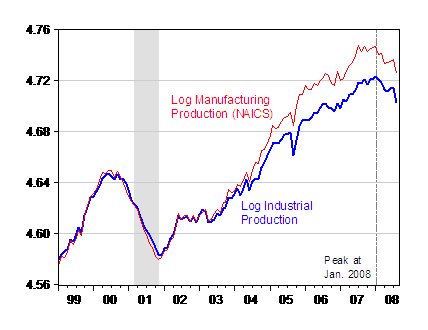
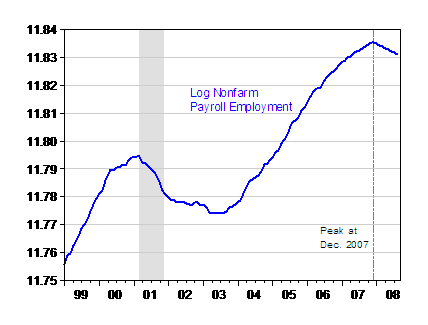
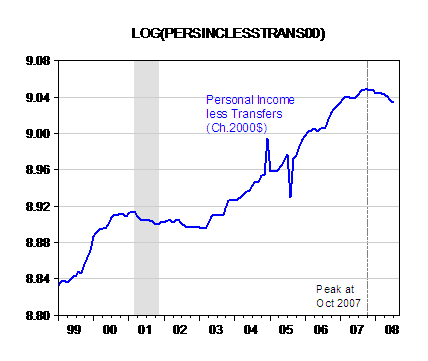
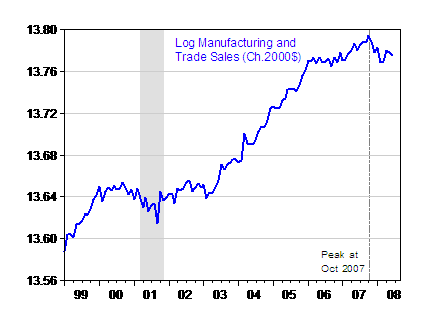
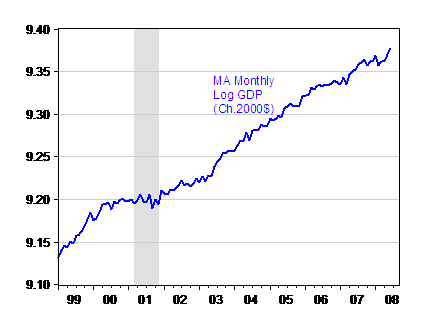
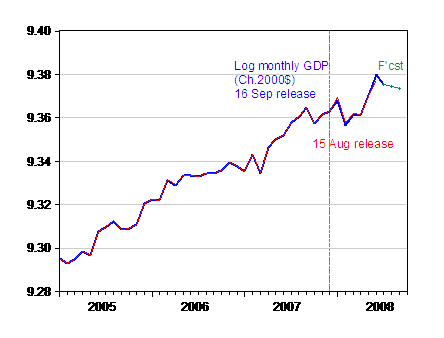
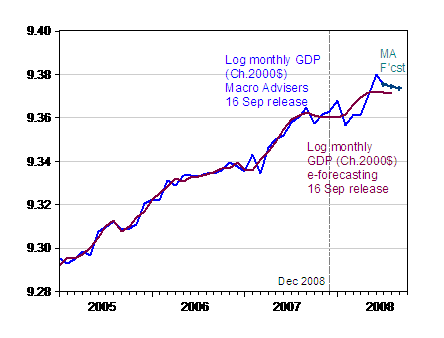
Quit Doling Out That Bad-Economy Line
By Donald Luskin
Sunday, September 14, 2008
“It was the worst of times, and it was the worst of times.” I imagine that’s what Charles Dickens would conclude about the current condition of the U.S. economy, based on the relentless drumbeat of pessimism in the media and on the campaign trail.
*****
Actually I bet the ghost of Charles Dickens has haunted Donald Luskin every day over the last decade for this incredibly abuse of his writing.
More from Luskin: “Full disclosure: I’m an adviser to John McCain’s campaign, though as far as I know, the senator has never taken one word of my advice.”
McCain showed at least some wisdom in this way!
Menzie
Excellent post. Those were difficult times for both the ordinary person, the bankers and economists. I note that you had suspicion that the economy was already in recession, but did not openly declare it. NBER was still two months from its declaration of recession and it was a year (late) in coming. What is fascinating and quite impressive was Professor Hamilton’s front page emoticon during this period. It spent 2007 switching from neutral to grumpy 3 times, indicating something serious going on with the economy, as well as giving reason for the DickF comment “My emotions have been on a roller coaster because we seem to move right up to recession then return to growth, then move right back up to recession then back again.”
The emoticon stayed grumpy from Jan 2008 until Aug. 2009. While still subject to interpretation, it was one of the most accurate calls out there.
https://econbrowser.com/archives/2009/08/econbrowser_emo
Ed
“NBER was still two months from its declaration of recession and it was a year (late) in coming.”
You do know I hope that NBER is all about doing the historical record and not the forecasting game. Of course their dating followed the actual onslaught of the Great Recession. And your point is ???
I would like to make one technical point.
Before Lehmann bros it was a credit crunch. After Lehmanns it was the GFC.
Agree or disagree
Bernanke’s latest book is a great read. The financial crisis was in full bloom well before Lehman’s collapsed. Now why we did not bail out or buy our Lehman’s is the great mystery.
BUT it was the Lehmann decision that made a recession inevitable and made interest rates a poor response as you cannot stimulate a housing sector that was just in a bubble
The macro numbers can not predict the effect of a “black swan” event. Indeed, they hid them. In the aftermath of Lehman, credit markets froze, investors froze, because the bedrock assumption that real estate/housing can never go down, went down.
Yea but some economists were predicting this crash early on. Krugman certainly did and Dean Baker takes every opportunity to remind us he did as well.
Please mention Bill McBride and Tanta.
“because the bedrock assumption that real estate/housing can never go down, went down.”
there were people who did not believe this, and made significant profits on the downturn. the big short is a nice read along these lines-and they weren’t the only players in this game. you can call it an assumption, but in reality what you had were a bunch of financial types who believed they were smarter and trickier than everybody else, and not properly assessing the risk of their investments. then you had a bunch of passive financial types (pension funds, etc) who were too lazy to look at their investments. just press the buy button and go out to lunch for the day, since bonds are boring and safe. i would argue is was as much the pathetic culture of the financial world as a poor bedrock assumption.
And, don’t forget, Congress forced banks to make increasingly more “affordable” home loans to people, who wouldn’t normally qualify. Otherwise, you were a racist. And, with “too-big-to-fail” banks couldn’t lose.
Citigroup knew it would end badly and was late to the party, but eventually had to compete. Ironically, it didn’t make the big gains in the early years, but took huge losses joining the party too late.
Oh please. These banks were not forced to do any such thing. They did it because they were making BIG money. Your little Citigroup tale contradicts your BS excuse making here. I guess we just figured out why some call you a failed banker.
Of course, banks took advantage of the naive policies Congress created.
It was like taking candy away from a baby.
Of course, Congress blamed the banks and taxpayers ultimately pay.
And, Congress found ways to punish the banks for its own dumb policies to recover some losses.
“banks took advantage of the naive policies Congress created.”
The banks did take advantage of the weakened regulatory system pushed by people like Phil Gramm.
You have mastered the art of self contradiction here! Well done!
FRED provides the S&P/Case-Shiller 20-City Composite Home Price Index indexed to 2000 = 100.
https://fred.stlouisfed.org/series/SPCS20RSA
When this index topped 200 in 2006, some feared we had a housing bubble. It did fall to around 140 but is now around 210!
pgl,
This is truly puzzling. I assumed that as so much damage had been wrought with the last housing bubble that massive safeguards would be built into the financial system (generals fighting the last war), and they have been. Yet housing price appreciation continues unabated. However I am waiting for the words “Everyone knows that…….” or “New Paradigm” or some such before calling it a bubble.
High prices does not necessarily mean a new housing bubble. The two fundamentals that would drive housing prices point are simply (a) the cash flows attributable to housing which can be proxied by rents on comparable places and (b) real interest rates.
Unless you are living under a rock, you might have recognized that real interest rates are quite low right now. And rents have risen in part because during the Great Recession we were not building that much in new housing.
baffling,
” you had were a bunch of financial types who believed they were smarter and trickier than everybody else, and not properly assessing the risk of their investments. then you had a bunch of passive financial types (pension funds, etc) who were too lazy to look at their investments.”
Actually these guys analyzed these things to death with data. And the reams of data showed that mortgages were exceptionally safe investments. No one could lose money on mortgages. What they failed to ask was “why?” It was because if anyone defaulted on their mortgage, the mortgage holder would be bailed out by the 50 year bull market in housing values. This allowed riskier and riskier mortgage practices. It was when housing values actually declined that the problem started.
And it wasn’t just the investors and financial institutions that made this mistake, but also government regulators that are supposed to prevent this sort of thing. Not a peep. And the Federal Government was front and center with Fannie and Freddie Mac, who were guaranteeing mortgages, which actually contributed to the bubble
sammy: Didn’t have anything to do with the truncated data sample used to analyze risks, assumptions in the copula based models of risk assessment? And do wonder, if it was Fannie and Freddie where the key problem was, why did private label derivatives go under first?
” if it was Fannie and Freddie where the key problem was”
Fannie and Freddie were just on of many contributors to the problem. I just used them as an example of government being fooled like most everyone else. If anybody says the problems were obvious and they saw it coming, I just ask them to show me a print out of their brokerage statements where they made an absolute fortune shorting financial institutions.
sammy A seven standard deviation event happening from a normal distribution is an impossibility. A seven standard deviation event happening from a fat-tailed distribution is not at all unusual. One lesson is that when working with tail probabilities you shouldn’t just assume a normal distribution out of mathematical convenience. And no probability distribution works if the rating companies are in cahoots with the fraud.
Fannie and Freddie didn’t help matters, but they were hardly the main problem. They were latecomers to the junk mortgage game. The reason Fannie and Freddie asked Congress to change the rules was because dishonest private mortgage companies were squeezing Fannie and Freddie out of the market.
Are we sure Sammy gets this as it is basic statistics?
Actually, it began in 1992, led by Barney Frank, imposing affordable housing requirements on Fannie and Freddie. Subprime mortgages started at 30% and rose to 50% in 2000. To meet the quota, lending standards had to be reduced, like no down payment loans.
PeakTrader: GSE’s were prohibited from purchasing subprime mortgages. Where do you get your documentation? Maybe you should read Lost Decades.
“The effort to reduce mortgage lending standards was led by the Department of Housing and Urban Development through the 1994 National Homeownership Strategy… It was the spreading of these looser standards to the prime loan market that vastly increased the availability of credit for mortgages, the speculation in housing, and ultimately the bubble in housing prices.”
https://spectator.org/42211_true-origins-financial-crisis/
PeakTrader You linked to the American Spectator??? Seriously? In addition to Menzie’s book, let me recommend Barry Eichengreen’s Hall of Mirrors. It has a nice extended discussion of the mortgage and financial crisis.
https://www.amazon.com/Hall-Mirrors-Depression-Uses-Misuses/dp/0190621079
“And the reams of data showed that mortgages were exceptionally safe investments. No one could lose money on mortgages.”
Actually no. Bundling can reduce diversifiable risk but it cannot change expected values. That is basic statistics. If you think bundling eliminates the expected loss from defaults, please do not go into banking. Or if you do, let us know which bank so we can sell it short.
I never said anything about bundling. You made it up just to hurl insults. I guess that’s how you get your jollies.
However bundling can SPREAD risk, similar to an insurance company or mutual fund, which is why those vehicles exist. Same with an MBS.
sammy: Unless the MBS’s get concentrated in a few institutions.
“Actually these guys analyzed these things to death with data. And the reams of data showed that mortgages were exceptionally safe investments. No one could lose money on mortgages.”
you can spend years analyzing the data, but if you do it wrong, your efforts are worthless. this goes to my original point. the financial types were either too lazy, too arrogant, or to ignorant to conduct proper analysis. you saw the results. you had financial institutions insuring these products with derivative products, and they had absolutely NO IDEA what they were actually insuring (i.e. aig). that was criminal.
“The ‘Big Short’ is a nice read along these lines.”
Another really good film was “Margin Call” which portrays the meltdown from the view of an investment bank that was holding a large portfolio of MBS.
Congress provided the opportunity – gave its blessing – for banks to make big money in risky home loans.
It was rational for banks to take advantage of the opportunity. Afterall, they’re in business to make money.
Of course, banks normally don’t make risky loans, because they don’t want to lose money.
If lending standards were gradually tightened, when the Bush Administration attempted to regulate Fannie and Freddie and the Greenspan Fed began the tightening cycle, both in 2004, the financial crisis and deep recession could’ve been averted.
“Congress provided the opportunity – gave its blessing – for banks to make big money in risky home loans. It was rational for banks to take advantage of the opportunity. After all, they’re in business to make money.”
You may have finally got something right. Senator Gramm (your boy) pushed this insane deregulation and his Republican buddies are trying to push this agenda once again.
Phil Gramm didn’t promote “affordable” home loans.
See your fellow clowns Barney Frank and Chris Dodd.
poorly vetted mortgages were a problem. mortgage companies worked in unison with bankers to commit fraud in the mortgage application paperwork, something honest peak trader seems unwilling to acknowledge. the element of fraud in the real estate market had the outsized affect of driving up, significantly, the price of real estate-into a bubble. blaming on underprivileged mortgage holders is simply a scapegoat. one of the biggest sources of the mortgage crisis were the condos in miami leading up to the real estate crash. these sales were not the result of banks being forced to deal with minorities, peak. when these properties crashed, and the speculators walked away from their loans, it created big problems. but then the financial types added their own gasoline to the fire, in the form of all the derivative products created to fund and insure the mortgage products. these were the result of the financial types-not congress peak-and these products were what ultimately led to the financial crisis we had to deal with. why were these products in existence? to allow the bankers to do god’s work? these products were created by bankers purely as a moneymaking scheme, adding outsized risk to the system which ultimately came true. the only people still in denial about the irresponsibility of the bankers in creating the financial crisis are a few remaining bankers who are unwilling to accept responsibility for their immoral behavior in the crisis.
Baffling, at least spell God with a capital G.
Congress created the environment of “moral hazard.”
Fraud wasn’t restricted to only lenders. Borrowers committed a lot of fraud too, including after the crisis, e.g. living in their homes for free.
After the crash, it’s easy to blame only financial institutions. And, spreading the risk worldwide had some benefits.
my god is not so arrogant peak. actually rather humble and forgiving. ready to wage a culture war again? is that what happens when your arguments prove weak and incorrect? dog whistles…
“sammy
September 12, 2018 at 5:14 pm
I never said anything about bundling. You made it up just to hurl insults. I guess that’s how you get your jollies.
However bundling can SPREAD risk, similar to an insurance company or mutual fund, which is why those vehicles exist. Same with an MBS.”
Ahem! Bundling is just a short hand for Mortgage Back Securities so yea Sammy you were referring to this. I addressed spreading risk aka diversification. But that does not reduce the mean as in expected losses.
So with all your overexcited rabblings, you clearly missed the simple point. Please, please, please do not run a financial institution. But if you do – let us know. We’ll sell it short and make BILLIONS.
It was even worse. The MBSs weren’t just bundled, they were split up and hidden in so many opaque ways that the unwary buyers of those MBSs didn’t and couldn’t know what was in each tranch. And then the banks relied upon highly skilled quants like PeakTrader to sort it all out.
Okay, it sounds like a few of the usual suspects need a little refresher on portfolio risk management. Just because a customer is a high risk does not mean banks should not lend to that customer. It’s not smart business to only lend to low risk customers. If you’re lending money, then you need to look at how risk is correlated with the rest of the portfolio. A very risky loan that is negatively correlated with the rest of the portfolio will lower the overall portfolio risk for a given return. So the problem wasn’t high risk folks seeking loans; the problem was banks who relied up phony risk ratings from the Big Three credit rating agencies and dimwitted bankers who decided it would be a good idea to positively correlate risk because doing so increased profits until there was a negative shock. Bankers were counting on being able to quickly unload securities on suckers when negative shocks hit the economy.
“the problem was banks who relied up phony risk ratings from the Big Three credit rating agencies”
A credit rating is supposed to signal the expected losses from default. MBS’s may reduce diversifiable risks but they cannot change the mean aka expected loss. And yet the credit rating agencies placed AAA ratings on these portfolios. I would have thought even a first year freshman who has taken finance and statistics could spot the error in this “logic”. But maybe not.
2slugbaits, the homeownership rate was too high, because of too many risky loans.
Those weak loans brought down the entire housing market.
It was a boom/bust. Investors didn’t care about “phony” securities or ratings when they were making lots of money.
They jumped on the bandwagon, like buying Cisco stock in the ‘90s at nosebleed levels.
PeakTrader It’s not the prospective borrower’s job to rate the riskiness of the loan. That’s what bankers and mortgage originators and ratings agencies are paid to do. And nonperforming loans are not in-and-of-themselves a problem. They’re only a problem when risks are correlated and understated. I agree that investors didn’t care because they were making lots of money. But that’s why god (oops, I mean God) created jails and piles of rocks to keep felonious bankers busy. Alas, unlike England’s 19th century workhouses, when it comes to white collar criminals it seems “something had occurred to stop them in their useful course.” I’m normally against the death penalty, but there are times when it wouldn’t be a bad idea if our justice system made an example of a few white collar criminals, much as the Chinese do from time to time.
2slugbaits, it’s not government’s job to encourage and support banks to make more and more risky loans, creating a housing bubble, and then blame the banks when it all crashes (except, shifting blame is what politicians like to do and do best).
peak, that is not what happened. financial types created the cdo, as a tool to move lesser quality subprime mortgages into the market. the government did not force this action-bankers did it because they could make money. but they had a flawed system coupled with individuals willing to commit fraud to sell the products. those cdo’s were filled with garbage but rated triple a. again this was not the governments doing. and to top it off, we through cds insurance on top of these, because since nobody defaults on a rising house price, this was again easy money for the financial types to collect from the public. do you see a pattern of ignorance and greed forming here, on the part of the financial types? my guess is the financial crisis does not happen if we do not have cds covering the crappy cdo products. banks and investors could handle a few mortgage holders folding, but they could not handle the failure of these exotic financial products they created themselves. bankers took the idea to expand credit and ran right over the cliff with it. these were the folks who should know better to begin with.
Baffling, you focus on the effect, not the cause.
The cause was the increasing quota of “affordable” loans.
“The GSEs began acquiring large numbers of subprime and other low-quality loans in the mid-1990s, as they tried to comply with the government’s affordable-housing requirements—quotas for mortgage purchases imposed by the Department of Housing and Urban Development (HUD) under legislation enacted by Congress in 1992.”
https://www.wsj.com/articles/SB10001424052970204791104577108183677635076
PeakTrader: You do know this is an op-ed by Peter Wallison, hardly the most dispassionate commentator on the financial crisis. One might say he has an axe to grind on the role of the GSEs.
Menzie Chinn, maybe you’ll believe the New York Times:
“[Fannie] announced in 2000 that it would buy $2 trillion in loans from low-income, minority and risky borrowers by 2010.”
https://www.nytimes.com/2008/10/05/business/05fannie.html
well peak, most of the economics profession seems to disagree with your assessment of the financial crisis. since you were a part of the problem, as a failed banker, it is not surprising you would take a position that avoids the responsibility of the bankers in this case. most of your comments on this blog related to the financial crisis are slanted to remove financial types from fault and simply blame government. but your excuses still do not explain why the cds products were used so irresponsibly by the financial firms-resulting in their failure. in fact, the derivatives market is still probably the most vulnerable and leading cause of the next financial crisis. i would gather many financial types are still ignorant of the full impact of these derivative products today, and simply think they are smart enough to pawn the problem on somebody else when things go bad. and as menzie said, wallison is not a good example for a defense.
“On one occasion, a hedge fund manager telephoned a senior Fannie executive to complain that the company was not taking enough gambles in chasing profits.”
if you read the article, you notice that the gse’s were very late to the game. so they did not cause the problem, although they helped to aggravate the problem. as you can see from the quote i took from the article, the problem was chasing profits. financial types from wall street were not “forced” to deal with the risky loans-they actually wanted more of them. why? because they were more profitable. had all the players-wall street, mortgage brokers, banks, gse’s, etc actually grown some b@!!$, they could have said these assets are not priced according to risk and avoided the problems. but all the business leaders i have seen were unable to do this-profit was of paramount importance-nothing else mattered. this stuff of blaming congress is bogus. what congress desired (but could not really enforce) was EXACTLY what wall street wanted-because they viewed it as profitable. but from a business risk perspective, it was simply stoopid. prior to the financial crisis, people had faith in bankers to be greedy by intelligent. a byproduct of the financial crisis showed just how stoopid the failed bankers really were. fannie and freddie got into trouble because they tried to mimic what the wall street bankers were doing, so as not to fall behind. their shareholders and investors put far more pressure on them than congress.
Bankers, Congress created “the game” and caused “the problem.”
Banks had no choice, but to play the game with each other, to be competitive.
Yes, financial institutions were happy making much more profit – that’s what they do.
“Banks had no choice, but to play the game with each other, to be competitive.”
many professions have rules on ethical behavior. engineers cannot design cheap and unsafe bridges for the public to cross simply because that would be more profitable. doctors cannot conduct unnecessary surgery simply because it is more profitable. apparently bankers do not have a code of ethics? because it seems to me committing fraud in order to make a profit should not be ethical. it is certainly not legal.
peak trader, you have presented a very pathetic excuse for the behavior of bankers. not surprising you would follow such logic, but i would imagine if there are any ethical bankers in existence (and i do believe they exist in plenty of numbers), they would disagree with you completely. time for you to accept blame and responsibility for your actions, peak. it is immature to blame somebody else for your poor decision making.
Baffling, banks played the cards they were dealt with the best way they could.
The dealer was unsafe.
I guess, you believe all lenders and borrowers should’ve ignored government policies, laws, and regulations.
Get real.
PeakTrader Sounds to me like you’re the one trying to shift blame.
What Caused the Financial Crisis
November 16, 2010
“Starting in the late 1990s, the government, as a social policy to boost homeownership, required Fannie Mae and Freddie Mac to acquire increasing numbers of “affordable” housing loans. (An “affordable loan” is made to people who normally would not qualify.)
By 2007, 55 percent of all loans made by Fannie and Freddie had to be “affordable.” By June 2008, there were 27 million subprime housing loans outstanding (19.2 million of them directly owed by government or government-sponsored agencies), with an unpaid principal amount of $4.6 trillion.”
“What we know is that almost 50 percent of all mortgages outstanding in the United States in 2008 were subprime or otherwise deficient and high-risk loans.
The fact that two-thirds of these mortgages were on the balance sheets of government agencies, or firms required to buy them by government regulations, is irrefutable evidence that the government’s housing policies were responsible for most of the weak mortgages that became delinquent and defaulted in unprecedented numbers when the housing bubble collapsed.
****
Bush Administration Tried to Reform Freddie and Fannie Five Years Ago
February 19, 2009
“Karl Rove, “We were briefed as far back as 2001 about the problems with Fannie and Freddie; in fact, we moved aggressively in 2004 to regulate Fannie and Freddie, actually got a bill through the Senate Banking and Finance Committee only to have it filibustered by [Sen.] Chris Dodd.”
Rove said Fannie Mae and Freddie Mac “accelerated their imprudent behavior after we attempted to regulate them. They bought almost as much mortgage debt from 2005 through 2008” as they bought in their first 30 years of their existence.
“In fact, in 2003, when we sent our first members of the Cabinet up to talk about this on Capitol Hill, Barney Frank had a hearing in which they basically beat up everybody we sent up there in pretty vociferous language.”
****
Mayor Bloomberg:
“I hear your complaints,” Bloomberg said. “Some of them are totally unfounded. It was not the banks that created the mortgage crisis. It was, plain and simple, Congress who forced everybody to go and give mortgages to people who were on the cusp.
Now, I’m not saying I’m sure that was terrible policy, because a lot of those people who got homes still have them and they wouldn’t have gotten them without that.
But they were the ones who pushed Fannie and Freddie to make a bunch of loans that were imprudent, if you will. They were the ones that pushed the banks to loan to everybody. And now we want to go vilify the banks because it’s one target, it’s easy to blame them and Congress certainly isn’t going to blame themselves.”